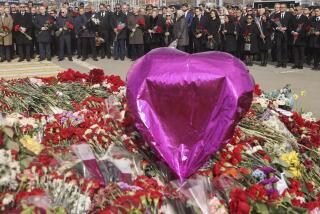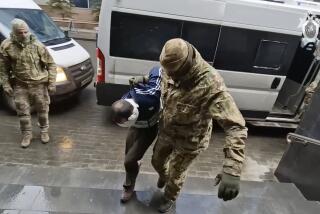Russians Among Al Qaeda Suspects
- Share via
MOSCOW — Among the 300 or so Al Qaeda suspects being detained at the Guantanamo Bay naval base in Cuba, Russia has identified three as Russian citizens from Muslim minorities, officials here said Tuesday.
At first blush, the announcement bolstered the Kremlin’s argument that guerrillas fighting in its separatist republic of Chechnya are part of a worldwide terrorist network with its core in Afghanistan and its tentacles reaching into countries around the world, including Russia.
But officials refrained Tuesday from crowing about the Guantanamo report. Perhaps it was because, on closer inspection, the facts fit less well with their rhetoric.
First, the three Russian citizens in Guantanamo are not Chechens--two are ethnic Tatars from central Russia, and the third is an ethnic Balkar, a member of a Muslim minority from the Caucasus that is distinct from the Chechens. Moreover, at least so far, the three Guantanamo detainees have not been linked to major crimes; the Russians have requested their extradition on charges of illegal border crossing and serving as mercenaries.
“Naturally, their case will be carefully investigated,” Sergei B. Prokopov, spokesman for the North Caucasus prosecutor general’s office, said by telephone from his office in Yessentuki. “Crossing the border illegally and being a mercenary is just the beginning of a long and painstaking process of finding out what these people have done and establishing whether they have had a hand in some other criminal offenses.”
Some ethnic Chechens undoubtedly did fight with Al Qaeda in Afghanistan. And Western officials have cited intelligence reports that Osama bin Laden sent money and military trainers to help Chechen fighters.
But since the war in Afghanistan began, little concrete evidence of an Afghan-Chechen link has surfaced. Journalists who have gone looking for Chechens in Afghan detention centers have so far come up empty-handed. The few Muslims they have found who hail from Russia have appeared to be not hardened fighters but individuals whose personal and spiritual journeys took them to Afghanistan--much like American Talib John Walker Lindh.
Even if Russia’s three Guantanamo prisoners had turned out to be Chechen, they would have constituted just 1% of the Al Qaeda suspects, observers note. There are five Britons.
“The fact that of the 300 people currently kept in Guantanamo only three may possibly be connected to the Chechen conflict--and even these three are not ethnic Chechens--destroys the myth that linked the conflict in Chechnya to the operation in Afghanistan,” said Stanislav Dmitriyevsky, co-chairman of the Russian-Chechen Friendship Society, a human rights group based in the city of Nizhny Novgorod.
Russia’s first war against Chechen separatists in 1994-96 was a humiliating disaster that left the republic with de facto independence. When Moscow launched its second war in September 1999, the Kremlin changed the rhetoric completely. Four bombs had gone off in Russian cities, killing about 300 people, so Russia was no longer fighting “separatists,” it was fighting “terrorists and bandits.” Whatever nationalist aims or historical grievances Chechens may have were submerged in the new rhetoric.
The events of Sept. 11 fueled the use of such language. During a news conference in Paris in January, Russian President Vladimir V. Putin turned combative when asked about Russian tactics in Chechnya.
“The notorious Al Qaeda terrorist organization is functioning in Afghanistan, and the Taliban criminal regime used to back it up. Everyone agreed to fight against them,” Putin said. “The same Al Qaeda is functioning in Chechnya under the protection of another criminal regime”--that of former Chechen President Aslan Maskhadov.
U.S. officials have supported the Russian position. Following Operation Anaconda in eastern Afghanistan, U.S. commanders, including Maj. Gen. Frank L. Hagenbeck, noted that the fiercest Al Qaeda fighters included Chechens.
“We’ve rid the world of hundreds of trained killers who will now not slaughter innocent men, women and children,” Hagenbeck said.
Still, at least so far, no Chechens have been identified among those captured.
Similarly, few outsiders have turned up among fighters detained by Russian forces in Chechnya. According to Prokopov of the regional prosecutor general’s office, there have been just three: two ethnic Uighurs, members of a Muslim minority from China, and one British citizen of Turkish descent.
Sergei Yastrzhembsky, a Putin aide and his top spokesman on Chechnya, declined to comment on the Guantanamo detainees, directing all queries to the prosecutor general’s office.
“The reason why the Russian authorities have been trying to actively create a logical link between Chechnya and Afghanistan in the public mind is rather simple,” said Dmitriyevsky, the friendship society official. “They are trying hard to find a justification for the use of force and human rights violations--or, if we call a spade a spade, war crimes--in Chechnya.”
Vyacheslav Izmailov, military analyst for the Novaya Gazeta newspaper, said Russia’s rhetoric is dangerous because “there is a world of difference between Afghanistan and Chechnya.”
“There is an element of terrorism in Chechnya, this is for sure, just as there is in many other places in the world,” Izmailov said. “But there is a whole complex of reasons [for the war]. . . . If we continue to ignore other causes of the Chechen conflict, this war will go on forever.”
*
Alexei V. Kuznetsov of The Times’ Moscow Bureau contributed to this report.
More to Read
Sign up for Essential California
The most important California stories and recommendations in your inbox every morning.
You may occasionally receive promotional content from the Los Angeles Times.










